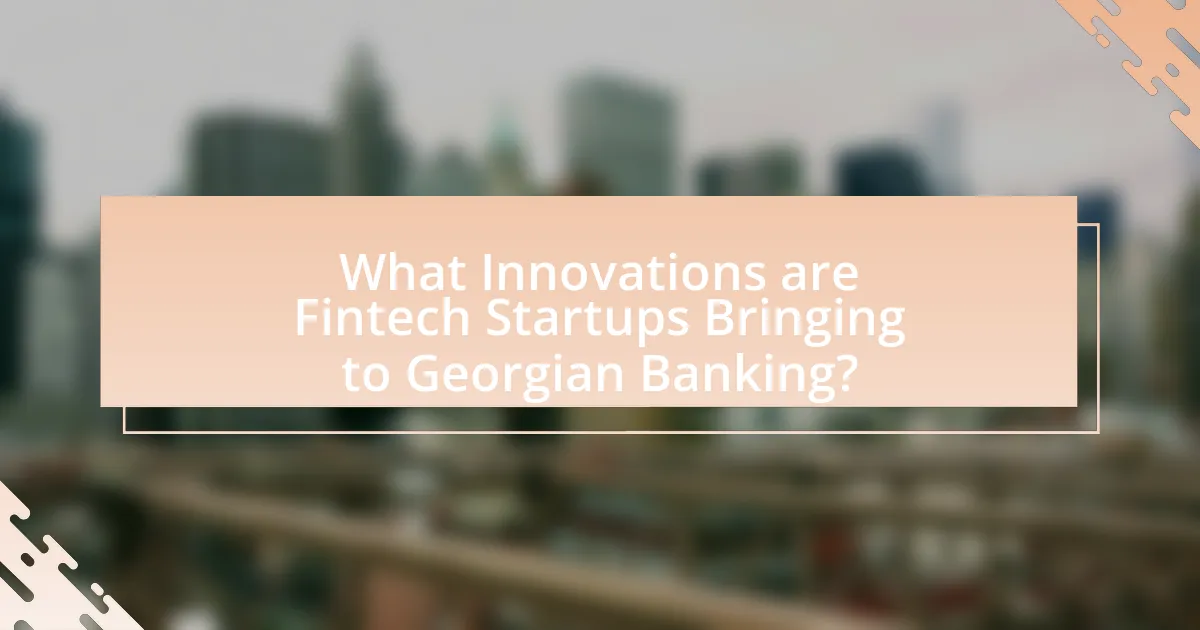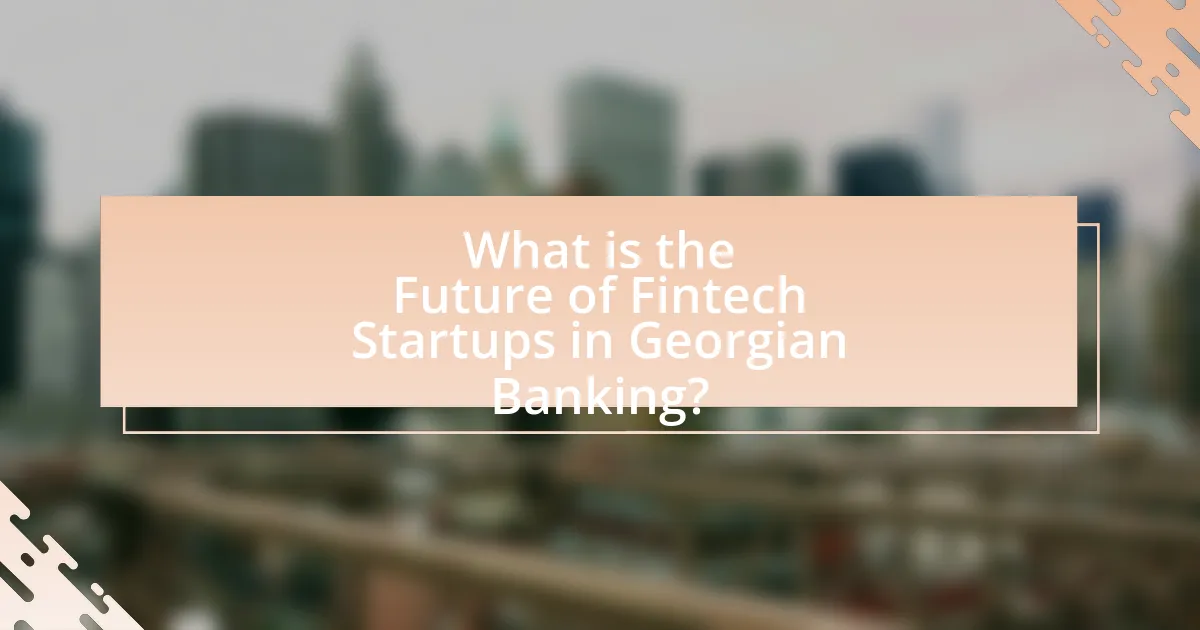Fintech startups are innovative companies that utilize technology to enhance financial services, playing a crucial role in the evolution of Georgian banking. These startups have emerged due to a favorable regulatory environment, increased internet penetration, and a tech-savvy population, leading to a significant rise in digital transactions and investment in the sector. The article explores the differences between fintech startups and traditional banks, the challenges faced by these startups, and the innovations they bring to improve customer experience and financial accessibility. Additionally, it examines the future of fintech in Georgia, including market dynamics, consumer behavior changes, and strategies for sustainable growth.

What are Fintech Startups and Their Role in Georgian Banking?
Fintech startups are innovative companies that leverage technology to provide financial services, and they play a significant role in Georgian banking by enhancing accessibility, efficiency, and customer experience. These startups have introduced digital payment solutions, online lending platforms, and personal finance management tools, which cater to the growing demand for convenient banking options among Georgian consumers. For instance, the National Bank of Georgia reported a 30% increase in digital transactions in 2022, highlighting the impact of fintech on traditional banking practices. Additionally, fintech startups in Georgia have attracted substantial investment, with over $50 million raised in 2021 alone, demonstrating their potential to transform the financial landscape in the country.
How have Fintech Startups emerged in Georgia’s banking sector?
Fintech startups have emerged in Georgia’s banking sector primarily due to a favorable regulatory environment and increasing consumer demand for digital financial services. The National Bank of Georgia has implemented progressive regulations that encourage innovation, such as the introduction of a regulatory sandbox, which allows startups to test their products in a controlled environment. Additionally, the growing smartphone penetration and internet access in Georgia have led to a surge in the adoption of mobile banking and payment solutions. As of 2023, over 50 fintech companies operate in Georgia, offering services ranging from digital wallets to peer-to-peer lending, reflecting a significant transformation in the banking landscape.
What factors contributed to the growth of Fintech Startups in Georgia?
The growth of Fintech startups in Georgia is primarily attributed to a favorable regulatory environment, increased internet penetration, and a young, tech-savvy population. The Georgian government has implemented progressive regulations that encourage innovation in financial technology, such as the establishment of a regulatory sandbox for startups. Additionally, internet penetration in Georgia has reached over 80%, facilitating access to digital financial services. The demographic advantage of a young population, with a significant portion under the age of 35, drives demand for modern financial solutions and supports the entrepreneurial ecosystem. These factors collectively create a conducive environment for the emergence and growth of Fintech startups in the region.
How do Fintech Startups differ from traditional banks in Georgia?
Fintech startups in Georgia differ from traditional banks primarily in their operational model and service delivery. Fintech startups leverage technology to provide financial services more efficiently, often offering lower fees and faster transactions compared to traditional banks, which rely on established, often slower, bureaucratic processes. For instance, a report by the National Bank of Georgia indicated that fintech companies have significantly reduced transaction times for money transfers, enhancing customer experience. Additionally, fintech startups typically focus on niche markets and innovative solutions, such as mobile payments and peer-to-peer lending, which are less emphasized by traditional banks that maintain a broader range of services but may lack agility in adopting new technologies.
What challenges do Fintech Startups face in Georgian Banking?
Fintech startups in Georgian banking face significant challenges, including regulatory hurdles, limited access to funding, and competition from established banks. Regulatory frameworks in Georgia can be complex and may not be fully adapted to the innovative nature of fintech, creating barriers to entry. Additionally, many fintech startups struggle to secure investment due to a lack of investor confidence in the local market, which is reflected in the relatively low levels of venture capital available in the region. Furthermore, established banks possess strong customer bases and brand recognition, making it difficult for new entrants to gain market share. These challenges hinder the growth and scalability of fintech startups in Georgia’s banking sector.
What regulatory hurdles impact Fintech Startups in Georgia?
Fintech startups in Georgia face several regulatory hurdles, including stringent licensing requirements, compliance with anti-money laundering (AML) regulations, and data protection laws. These regulations necessitate that startups obtain specific licenses from the National Bank of Georgia, which can be a lengthy and complex process. Additionally, adherence to AML regulations requires robust systems for monitoring transactions and reporting suspicious activities, which can be resource-intensive for new companies. Furthermore, compliance with data protection laws, such as the General Data Protection Regulation (GDPR), imposes additional operational challenges, particularly in managing customer data securely. These regulatory frameworks can hinder the agility and innovation potential of fintech startups in Georgia.
How do market dynamics affect the success of Fintech Startups?
Market dynamics significantly influence the success of Fintech startups by shaping their operational environment and competitive landscape. Factors such as regulatory changes, consumer behavior shifts, and technological advancements directly impact how these startups develop their products and attract customers. For instance, a report by McKinsey & Company highlights that regulatory support can enhance market entry for Fintechs, while consumer demand for digital solutions drives innovation and service diversification. Additionally, the rapid adoption of mobile banking in Georgia, as reported by the National Bank of Georgia, illustrates how changing consumer preferences can create opportunities for Fintech startups to thrive.

What Innovations are Fintech Startups Bringing to Georgian Banking?
Fintech startups are introducing several key innovations to Georgian banking, including digital banking solutions, blockchain technology, and enhanced payment systems. These innovations streamline banking processes, improve customer experience, and increase financial inclusion. For instance, digital banking platforms allow users to manage their finances through mobile applications, significantly reducing the need for physical bank visits. Additionally, the adoption of blockchain technology enhances security and transparency in transactions, while advanced payment systems facilitate quicker and more efficient transactions. According to a report by the National Bank of Georgia, the fintech sector has seen a growth rate of over 30% annually, indicating a strong impact on the traditional banking landscape.
How are Fintech Startups enhancing customer experience in banking?
Fintech startups are enhancing customer experience in banking by leveraging technology to provide personalized, efficient, and accessible financial services. These startups utilize data analytics and artificial intelligence to tailor services to individual customer needs, resulting in improved user satisfaction. For instance, according to a report by McKinsey, digital banking solutions can reduce transaction times by up to 80%, allowing customers to complete banking tasks quickly and conveniently. Additionally, fintech platforms often offer user-friendly interfaces and 24/7 access to services, which significantly enhances the overall banking experience.
What technologies are being utilized by Fintech Startups in Georgia?
Fintech startups in Georgia are utilizing technologies such as blockchain, artificial intelligence (AI), machine learning, and mobile applications. Blockchain technology is employed for secure transactions and transparency, while AI and machine learning are used for data analysis, fraud detection, and personalized financial services. Mobile applications facilitate user-friendly access to banking services, enhancing customer engagement. These technologies are critical in driving innovation and efficiency within the Georgian banking sector, as evidenced by the increasing number of startups leveraging these tools to improve financial services and customer experiences.
How do these innovations improve financial accessibility for consumers?
Innovations in fintech startups enhance financial accessibility for consumers by providing digital banking solutions that reduce barriers to entry. These solutions often include mobile banking apps, online loan applications, and peer-to-peer payment systems, which allow consumers to access financial services without the need for traditional banking infrastructure. For instance, a report by McKinsey & Company highlights that fintech companies have increased access to credit for underserved populations by offering alternative credit scoring models, which can approve loans for individuals with limited credit histories. This shift not only democratizes access to financial products but also fosters financial inclusion, enabling a broader segment of the population to participate in the economy.
What financial products are being offered by Fintech Startups in Georgia?
Fintech startups in Georgia are offering a range of financial products including digital banking services, peer-to-peer lending platforms, mobile payment solutions, and investment management tools. These products cater to the growing demand for accessible and efficient financial services in the region. For instance, digital banking services allow users to manage their finances online without the need for traditional banking infrastructure, while peer-to-peer lending platforms facilitate direct loans between individuals, bypassing conventional banks. Mobile payment solutions enable quick and secure transactions via smartphones, and investment management tools provide users with options to invest in various financial instruments. The emergence of these products reflects the innovative landscape of Georgia’s fintech sector, which has seen significant growth in recent years.
Which types of services are most popular among Georgian consumers?
Financial services, particularly digital banking and mobile payment solutions, are the most popular among Georgian consumers. The rise of fintech startups in Georgia has led to increased adoption of services such as online banking, peer-to-peer payment platforms, and mobile wallets. According to a 2022 report by the National Bank of Georgia, over 60% of the population engages with digital banking services, highlighting a significant shift towards technology-driven financial solutions. This trend reflects a growing preference for convenience and accessibility in managing personal finances.
How do these products compare to those offered by traditional banks?
Fintech products often provide more innovative features and lower fees compared to traditional bank offerings. For instance, fintech startups typically leverage technology to streamline processes, resulting in faster transactions and enhanced user experiences. According to a 2022 report by McKinsey, fintech companies can reduce operational costs by up to 30% through automation and digital solutions, allowing them to offer competitive pricing. Additionally, fintech products often include advanced analytics and personalized services that traditional banks may not provide, catering to the specific needs of consumers in a more agile manner.

What is the Future of Fintech Startups in Georgian Banking?
The future of fintech startups in Georgian banking is poised for significant growth and innovation. The Georgian government has actively supported the fintech sector through regulatory frameworks that encourage investment and entrepreneurship, such as the establishment of a regulatory sandbox by the National Bank of Georgia. This initiative allows startups to test their products in a controlled environment, fostering innovation. Additionally, the increasing adoption of digital banking solutions among consumers, with a reported 60% of the population using online banking services as of 2023, indicates a strong market demand for fintech solutions. Furthermore, partnerships between traditional banks and fintech companies are becoming more common, enhancing service offerings and customer experience. These factors collectively suggest a promising trajectory for fintech startups in the Georgian banking landscape.
How is the competitive landscape evolving for Fintech Startups in Georgia?
The competitive landscape for Fintech startups in Georgia is rapidly evolving due to increased investment, regulatory support, and a growing consumer base. In recent years, the Georgian government has implemented favorable regulations, such as the establishment of a regulatory sandbox, which encourages innovation and allows startups to test their products in a controlled environment. Additionally, the total investment in Georgian Fintech reached approximately $100 million in 2022, reflecting a significant increase in interest from both local and international investors. This influx of capital is fostering a diverse range of services, from digital payments to lending platforms, thereby intensifying competition among startups. As a result, established financial institutions are also adapting by collaborating with Fintechs, further reshaping the competitive dynamics in the market.
What trends are shaping the future of Fintech in the Georgian banking sector?
The future of Fintech in the Georgian banking sector is being shaped by several key trends, including the rise of digital banking, increased adoption of blockchain technology, and a focus on regulatory compliance. Digital banking is transforming customer experiences, with banks offering mobile apps and online services that enhance accessibility and convenience. The adoption of blockchain technology is streamlining transactions and improving security, as evidenced by the growing number of startups leveraging this technology for payment solutions. Additionally, regulatory frameworks are evolving to support innovation while ensuring consumer protection, which is crucial for fostering trust in Fintech solutions. These trends collectively indicate a significant shift towards a more technology-driven banking environment in Georgia.
How might consumer behavior change in response to Fintech innovations?
Consumer behavior may change significantly in response to Fintech innovations by increasing the adoption of digital financial services and altering spending habits. As consumers become more familiar with mobile banking, peer-to-peer payment systems, and automated investment platforms, they are likely to prioritize convenience and accessibility over traditional banking methods. For instance, a report by McKinsey & Company indicates that 75% of consumers are willing to use digital-only banks, reflecting a shift towards online financial solutions. Additionally, the rise of Fintech has led to greater financial literacy among consumers, as many platforms offer educational resources that empower users to make informed financial decisions. This shift not only enhances user engagement but also fosters a more competitive financial landscape, compelling traditional banks to innovate and adapt to changing consumer preferences.
What strategies can Fintech Startups adopt for sustainable growth in Georgia?
Fintech startups in Georgia can adopt strategies such as leveraging regulatory advantages, focusing on customer-centric solutions, and forming strategic partnerships for sustainable growth. Georgia offers a favorable regulatory environment, including a low tax regime and supportive government policies, which can be utilized by startups to minimize operational costs and enhance profitability. Additionally, prioritizing customer needs through innovative financial products and services can help attract and retain users, as evidenced by the increasing demand for digital banking solutions in the region. Forming partnerships with established financial institutions can provide access to resources, expertise, and customer bases, further driving growth. These strategies are supported by the rapid expansion of the fintech sector in Georgia, which has seen significant investment and interest from both local and international players.
How can partnerships with traditional banks benefit Fintech Startups?
Partnerships with traditional banks can significantly benefit Fintech startups by providing access to established customer bases and regulatory frameworks. Traditional banks possess extensive customer networks, which Fintech startups can leverage to rapidly scale their services and enhance market penetration. Additionally, banks have established compliance and regulatory processes that can help Fintech startups navigate complex financial regulations more efficiently. For instance, a study by Accenture found that 70% of Fintech firms believe partnerships with banks improve their chances of success by facilitating access to capital and resources. This collaboration can lead to innovative product offerings that combine the agility of Fintech with the stability of traditional banking, ultimately driving growth and customer satisfaction.
What role does customer feedback play in the development of Fintech services?
Customer feedback is crucial in the development of Fintech services as it directly informs product enhancements and user experience improvements. By analyzing customer insights, Fintech companies can identify pain points, preferences, and emerging trends, allowing them to tailor their offerings to meet market demands effectively. For instance, a study by PwC found that 54% of Fintech companies prioritize customer feedback to refine their services, demonstrating its significance in driving innovation and customer satisfaction within the sector.
What best practices should Fintech Startups follow in Georgian Banking?
Fintech startups in Georgian banking should prioritize regulatory compliance, customer-centric innovation, and robust cybersecurity measures. Regulatory compliance is crucial as it ensures adherence to the National Bank of Georgia’s guidelines, which fosters trust and legitimacy in the financial ecosystem. Customer-centric innovation involves developing user-friendly digital solutions that address specific needs of Georgian consumers, as evidenced by the increasing demand for mobile banking services, which grew by 30% in 2022. Additionally, implementing robust cybersecurity measures is essential to protect sensitive financial data, especially given that cyberattacks on financial institutions have increased by 40% globally. By focusing on these best practices, fintech startups can effectively navigate the Georgian banking landscape and contribute to its growth.